Dry-Aging Chicken is the Ultimate Roasting Trick

Dry aging beef, while totally delicious, is old news. Chefs drank the Kool-Aid long ago: Exposing meat to air (in a climate-controlled area) for a period of time – from a few hours up to many months – renders it more tender (due to enzymes at work in the muscle fibers) and more flavorful (and some would say "funky" – in part due to moisture loss). But at Lower48 Kitchen in Denver, chef Alex Figura is taking the technique to the next level, applying it to poultry. He began experimenting with dry aging chicken while working with chef Dan Barber at Blue Hill at Stone Barns in Pocantico Hills, New York. Here, he explains his process.
"Dry aging creates a tender, more succulent meat, and you get a really nice crispy skin also. We do it for ducks, pheasant, guinea hens. For duck, first we dunk them in boiling water for 30 seconds to kill bacteria, then we shock them in ice water. This process firms up the skin. Then we dry age the bird for a minimum of three days.
For chicken, we first brine the bird for two hours in heavily salt water with leeks, lemon and black pepper. We remove the legs from the body, and then we make sure the skin is evenly spread over the breast meat, in order to protect it while it ages. Then we put the chicken on a rack in the walk-in refrigerator, exposed to a fan (a home refrigerator with good airflow should work just as well) and age it for at least seven days, but no more than two weeks.
We've noticed that if you brine and then dry your chicken, even if you overcook it, you still get a nice moist bird and an extremely crispy skin."
RELATED: Roast Chicken Recipes